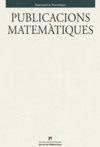Structure monoids of set-theoretic solutions of the Yang-Baxter equation
IF 0.8
3区 数学
Q2 MATHEMATICS
引用次数: 11
Abstract
Given a set-theoretic solution $(X,r)$ of the Yang--Baxter equation, we denote by $M=M(X,r)$ the structure monoid and by $A=A(X,r)$, respectively $A'=A'(X,r)$, the left, respectively right, derived structure monoid of $(X,r)$. It is shown that there exist a left action of $M$ on $A$ and a right action of $M$ on $A'$ and 1-cocycles $\pi$ and $\pi'$ of $M$ with coefficients in $A$ and in $A'$ with respect to these actions respectively. We investigate when the 1-cocycles are injective, surjective or bijective. In case $X$ is finite, it turns out that $\pi$ is bijective if and only if $(X,r)$ is left non-degenerate, and $\pi'$ is bijective if and only if $(X,r)$ is right non-degenerate. In case $(X,r) $ is left non-degenerate, in particular $\pi$ is bijective, we define a semi-truss structure on $M(X,r)$ and then we show that this naturally induces a set-theoretic solution $(\bar M, \bar r)$ on the least cancellative image $\bar M= M(X,r)/\eta$ of $M(X,r)$. In case $X$ is naturally embedded in $M(X,r)/\eta$, for example when $(X,r)$ is irretractable, then $\bar r$ is an extension of $r$. It also is shown that non-degenerate irretractable solutions necessarily are bijective.Yang-Baxter方程集论解的结构单群
给定Yang-Baxter方程的一个集论解$(X,r)$,我们用$M=M(X,r。结果表明,在$a$上存在一个$M$的左作用和在$a'$上存在的$M$右作用,并且关于这些作用,分别存在系数为$a$和$a'$的$\pi$和$\pi'$的1-共循环。我们研究了1-并环何时是内射的、满射的或双射的。在$X$是有限的情况下,证明$\pi$是双射的当且仅当$(X,r)$是左非退化的,并且$\pi'$是双反的当且唯当$(X,r)美元是右非退化的。在$(X,r)$是非退化的,特别是$\pi$是双射的情况下,我们定义了$M(X,r)$上的半桁架结构,然后我们证明了这在$M(X,r)美元的最小可消去图像$\bar M=M(X、r)/\eta$上自然地诱导了一个集理论解$(\bar M,\bar r)$。如果$X$自然嵌入$M(X,r)/\eta$中,例如当$(X,r)$不可处理时,则$\bar r$是$r$的扩展。还证明了非退化不可调和解必然是双射的。
本文章由计算机程序翻译,如有差异,请以英文原文为准。
求助全文
约1分钟内获得全文
求助全文
来源期刊
CiteScore
1.60
自引率
0.00%
发文量
29
审稿时长
>12 weeks
期刊介绍:
Publicacions Matemàtiques is a research mathematical journal published by the Department of Mathematics of the Universitat Autònoma de Barcelona since 1976 (before 1988 named Publicacions de la Secció de Matemàtiques, ISSN: 0210-2978 print, 2014-4369 online). Two issues, constituting a single volume, are published each year. The journal has a large circulation being received by more than two hundred libraries all over the world. It is indexed by Mathematical Reviews, Zentralblatt Math., Science Citation Index, SciSearch®, ISI Alerting Services, COMPUMATH Citation Index®, and it participates in the Euclid Project and JSTOR. Free access is provided to all published papers through the web page.
Publicacions Matemàtiques is a non-profit university journal which gives special attention to the authors during the whole editorial process. In 2019, the average time between the reception of a paper and its publication was twenty-two months, and the average time between the acceptance of a paper and its publication was fifteen months. The journal keeps on receiving a large number of submissions, so the authors should be warned that currently only articles with excellent reports can be accepted.

 求助内容:
求助内容: 应助结果提醒方式:
应助结果提醒方式:


